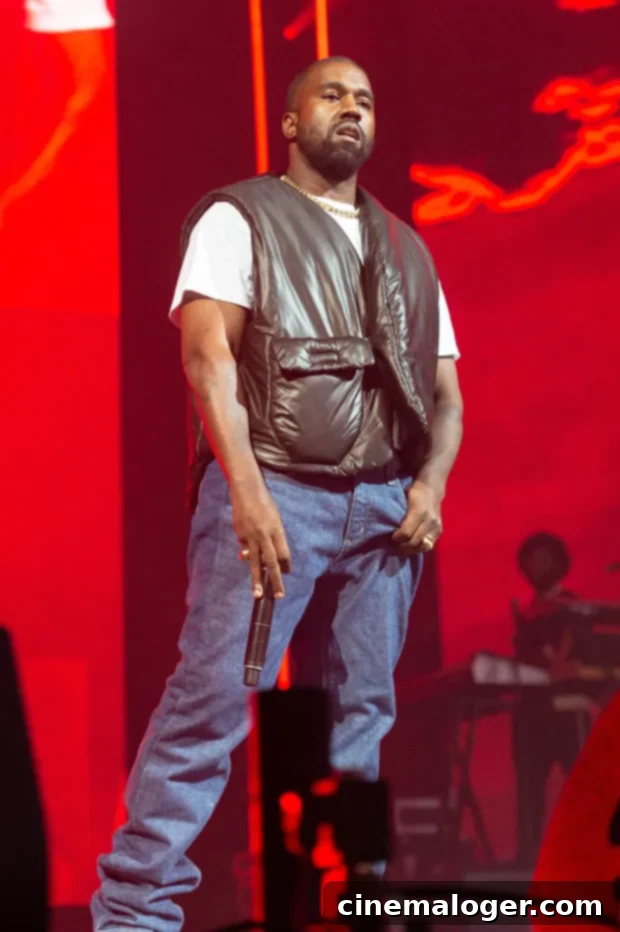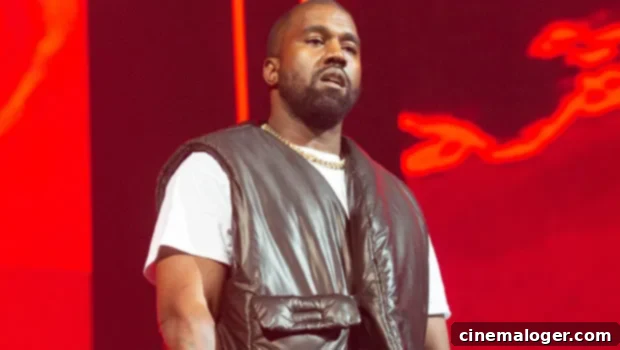Kanye West’s Grammy Performance Ban: The Controversy, The Game’s Stance, and Industry Implications
In a dramatic turn of events leading up to music’s most prestigious night, rapper Kanye West, also known as Ye, was reportedly barred from performing at the upcoming Grammy Awards. The news, which surfaced on March 19, sent ripples through the entertainment industry, confirming earlier speculation. According to Variety, representatives for the “Famous” singer were informed that his scheduled performance was revoked due to his “concerning online behavior.” This decision immediately drew criticism and debate, with many fans and fellow artists weighing in on the Recording Academy’s controversial move. One of the most vocal defenders of Kanye West was his frequent collaborator, The Game, who swiftly took to social media to express his disapproval and offer his own theories on the ban.
The Game’s Vehement Defense and Allegations of Systemic Disrespect
Shortly after the news broke, The Game, whose real name is Jayceon Terrell Taylor, voiced his strong opinions on Instagram. He suggested that the Recording Academy’s decision was directly linked to Kanye’s recent social media attacks against Trevor Noah, the esteemed host of the Grammys scheduled for April 3. In his post, The Game implied that the move was not unexpected, writing, “The Grammys have at the last minute decided to pull @kanyewest from performing on the show as if we didn’t know it was coming.”
View this post on InstagramA post shared by The Game (@losangelesconfidential)
The Game offered a two-fold explanation for the Grammy ban. He posited that the decision could stem from “a conversation held amongst [Trevor Noah’s] team & the academy,” implying direct pressure or concern from the host’s side. Alternatively, he suggested it might be linked to Kanye’s recent Instagram suspension, an event he found perplexing given the platform’s often-lax enforcement against “all the negativities of the world” that “can be found on the same app with no repercussions or suspensions.” This pointed critique highlights a common sentiment among artists and users who question social media platforms’ content moderation policies.
Beyond the immediate circumstances, The Game expanded his argument to a broader critique of the music industry, particularly the Grammys, and their treatment of Black artists. He articulated a long-standing frustration, stating, “Time & time again they show us that they only want to STEAL the culture, not allow you to ever be their equals.” This powerful statement suggests that the Grammy ban isn’t an isolated incident but rather a symptom of a deeper, continuous pattern of “disrespect for us & all that we have brought to the table in entertainment, media & sports over the last 100 years especially.” The Game’s words resonated with many who feel that despite their profound influence, Black artists often face unfair scrutiny and unequal opportunities within mainstream award systems.
Kanye’s “Concerning Online Behavior”: The Catalyst for the Ban
The Recording Academy’s official stance, citing Kanye’s “concerning online behavior,” refers to a series of high-profile social media incidents that garnered significant public attention and criticism. The most prominent of these involved his direct attacks on Trevor Noah. The host of The Daily Show had previously discussed Kanye’s turbulent and drama-filled split from his ex-wife, Kim Kardashian, on his program. Noah’s commentary, which was empathetic yet critical of Kanye’s public behavior towards Kim, seemed to provoke Kanye, leading him to post a screenshot of a Google search result describing Noah using a racial slur in the caption. This act resulted in Kanye being banned from Instagram for 24 hours, a rare move by the platform against such a high-profile user.
The incident with Trevor Noah, especially given Noah’s role as the Grammy host, undoubtedly created an untenable situation for the award show producers. The risk of Kanye West and Trevor Noah having a contentious, or even confrontational, moment during a live broadcast was deemed too high. Such an interaction could overshadow the entire event, diverting attention from the celebration of music to an ongoing personal feud. The Grammys, keen to maintain a professional and celebratory atmosphere, likely sought to avoid any potential disruption.
Furthermore, Kanye’s online behavior extended beyond his conflict with Trevor Noah. He had also been relentlessly harassing Kim Kardashian and her new boyfriend, Pete Davidson, through a series of public social media posts. These posts, which included personal attacks and threats, raised concerns about cyberbullying and appropriate conduct. The Recording Academy likely considered the cumulative effect of these actions, viewing them as a pattern that was inconsistent with the decorum expected of a performer on its stage. The integrity and reputation of the Grammys were at stake, compelling them to make a difficult but, for them, necessary decision.

Kanye’s Grammy History and the Significance of a Performance Slot
Despite the controversy, Kanye West remained a significant presence in this year’s Grammy nominations, receiving five nods for his critically acclaimed album Donda, including the coveted Album of the Year category. While he was not on the initial list of performers announced earlier in the week, Variety reported that he “may have been a planned performer,” suggesting that discussions for his involvement were indeed underway before the ban. A Grammy performance slot is one of the most highly sought-after opportunities in the music industry, offering unparalleled exposure and prestige to artists at the peak of their careers.
Kanye West boasts an impressive and often tumultuous history with the Grammys. Over his career, he has accumulated a staggering number of awards, making him one of the most decorated artists in Grammy history. However, his relationship with the Recording Academy has also been marked by controversy, including past instances of him openly criticizing the awards or interrupting acceptance speeches. This history, coupled with his recent online behavior, placed the Academy in a difficult position, forcing them to balance an artist’s undeniable musical talent with their public conduct.
Broader Implications for Artists and Awards Shows
The decision to remove Kanye West from the Grammy lineup ignites crucial conversations about the boundaries of artistic freedom versus professional responsibility, especially in the age of pervasive social media. While artists are often celebrated for their authenticity and willingness to challenge norms, the industry also expects a certain level of decorum, particularly when representing major institutions like the Grammys. The incident highlights the growing power of social media to both amplify an artist’s voice and to create unforeseen consequences for their career.
For the Recording Academy, this decision sets a precedent. It signals that while artistic merit is paramount, extreme “online behavior” that verges on harassment or poses a direct threat to the show’s atmosphere will not be tolerated. This stance could influence how other awards shows and major industry events manage high-profile artists who engage in controversial social media activity. It also forces a re-evaluation of the relationship between artists, their public persona, and the institutions that celebrate their work.
The Game’s passionate defense further complicates the narrative, framing the ban not just as a reaction to individual behavior but as part of a larger, systemic issue within the industry. This perspective resonates with ongoing debates about diversity, equity, and inclusion in entertainment, prompting questions about whether similar actions would be taken against artists from different backgrounds or with different levels of influence. The conversation extends beyond Kanye West, touching upon fundamental questions about fairness, representation, and accountability in the music world.
Conclusion: A Precedent Set
Ultimately, Kanye West’s exclusion from the Grammy performance lineup is a multifaceted event, rooted in his recent concerning online conduct but echoing deeper industry tensions. While his nominations for Donda underscore his undeniable musical genius, the Recording Academy’s decision firmly prioritizes the integrity and atmosphere of its show. As the Grammys approach, the absence of one of music’s most influential and polarizing figures will undoubtedly be felt, and the discourse sparked by this ban—from discussions on social media ethics to systemic industry biases—will continue to shape conversations about the future of music and entertainment.
HollywoodLife has reached out to Kanye’s reps and the Grammys for further comment on this evolving situation, anticipating further statements or clarifications as the awards ceremony draws nearer.
